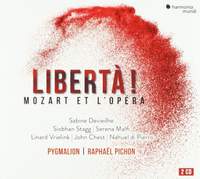Recording of the Week,
A Mozart Requiem with a twist from Pygmalion and Raphaël Pichon
There’s a twist, but not perhaps along the lines you might be expecting. Whereas several relatively recent recordings have presented completions and orchestrations by contemporary composers, Pichon opts for the familiar version by Mozart’s pupil Franz Xaver Süssmayr – partly on grounds of the strong emotional connection which so many listeners have to this incarnation of the Mass, and partly because of his conviction that Süssmayr received many of his ideas from the horse’s mouth. (As Pichon explains in an erudite booklet-note, his decade-long immersion in the score has led him to believe that Süssmayr was working from notes which have been lost to the mists of time or from conversations which he had with Mozart on his sickbed).
Where Pichon departs from the norm is in the interpolation of germane fragments and sketches from the early part of Mozart’s life: as on the Presto Award-winning Libertà! back in 2019, he presents compelling evidence that the seeds of Mozart’s mature masterpieces were sown in the composer’s extreme youth, and the results are truly ear-opening.
The first sound we hear is the ethereally sweet voice of eleven-year-old treble Chadi Lazreq, intoning the plainchant In Paradisum – cut off abruptly by the stark four-voice canon ‘Ach zu kurz ist unsers Lebens Lauf’, it returns in full at the end of the Mass as an expression of catharsis. (Lazreq was just seven when he first took part in this project, which began life as a fully-staged production directed by Romeo Castellucci, and clearly understands his assignment here).
That early canon is followed by a Palestrina-esque Miserere which Mozart wrote at the age of fifteen (just a year after hearing Allegri’s setting in Rome), the first three notes in the sopranos sounding like a faint pencil-outline of the first choral entry in the Requiem itself. When the Mass proper gets underway, Pichon seems at pains to remind us of Mozart’s indebtedness to the Baroque tradition: no full-fat portentousness here, but instead a startling amount of light and shade, and a stile galant lilt (listen to the articulation of those quavers in the opening pages) which looks back to early CPE Bach rather than forward to Verdi.
The quality of the choral singing in the Introitus, Kyrie and first Sequentia would be reason enough to recommend this new recording in itself: with trenchant diction, matchless agility and superb legato when required, everyone sounds fully invested in the drama, perhaps thanks to the experience of working on that Castellucci production in 2019. The Dies irae in particular is hair-raising stuff, its impact all the more powerful for being preceded by a bass aria which the seventeen-year-old Mozart composed for Thamos, König in Ägypten – with its ominous swirling strings and declamatory vocal lines, it sounds for all the world like an early draft of the Commendatore Scene in Don Giovanni.
This is our first encounter with the imposing bass Alex Rosen, who also makes a great impact in the opening of the Tuba mirum; he and the wine-dark Scottish mezzo Beth Taylor add wonderful gravitas to the solo quartet without ever overwhelming their lighter-voiced colleagues Ying Fang and Laurence Kilsby. Perhaps Pichon’s swift tempi in the quartet movements won’t be to everyone’s taste, but certainly they convey a keen sense of the dying composer’s race against time.
Other interpolations include a vocal exercise which eventually became the soprano solo in the Kyrie of the C minor Mass (beautifully done by Lazreq), the chorale ‘O Gottes Lamm’, and an anonymous choral arrangement of the Adagio from the Gran Partita which provoked such wonder and despair from Salieri in Peter Shaffer’s Amadeus. All of these connecting threads pull together to create a wonderfully rich tapestry, and one which earns my strongest recommendation.
Chadi Lazreq (treble), Ying Fang (soprano), Beth Taylor (mezzo), Laurence Kilsby (tenor), Alex Rosen (bass)
Pygmalion, Raphaël Pichon
Available Formats: CD, MP3, FLAC/ALAC/WAV, Hi-Res FLAC/ALAC/WAV
Sabine Devieilhe (soprano), Siobhan Stagg (soprano), Serena Malfi (mezzo), Linard Vrielink (tenor), John Chest (baritone), Nahuel di Pierro (bass-baritone)
Pygmalion, Raphaël Pichon
Available Formats: 2 CDs, MP3, FLAC/ALAC/WAV, Hi-Res FLAC/ALAC/WAV





